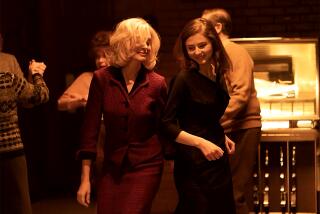FICTION
- Share via
MOTHERHOUSE by Jeanine Hathaway (Hyperion: $22.95; 184 pp.) Whatever you think about nuns, you’ll think differently after reading this autobiographical novel. Nothing Jeanine Hathaway does here is predictable, though the plot would seem to be a standard one: An 18-year-old Catholic girl from Chicago, oldest of nine children, enters a Dominican “Motherhouse” in 1963 as a postulant. Her security in centuries-old ritual is upset by the reforms of Vatican II; her faith in God is shaken by a brother’s death and her father’s abandonment of the family. The long struggle between her desire for self-expression and the order’s ideal of self-abnegation is resolved when she becomes, like Hathaway, a poet.
The originality, like God himself, is in the details. The narrator, Sister Kristin, is a rebel but a quiet one. Her faith is neither sweet nor harsh; it’s complex, nuanced, intelligent. The order can tyrannize--in the name of discouraging exclusive friendships, a superior brands Kristin and another postulant as possible lesbians--but it also can comfort: When the news about her brother arrives, “at no time am I not connected; someone always has her hand on my shoulder, her arm around me.” A session of “spiritual renewal” under the guidance of a priest is, in one sense, the church’s way of enforcing conformity; but it’s also humor and therapy and something close to a love affair.
Above all, the author has been there. “Motherhouse” isn’t a work of stylistic bravura and thrilling intuition like Ron Hansen’s convent novel “Mariette in Ecstasy,” but it has the ring of authority--all the more so because Hathaway, who left the Dominicans, shows no bitterness. Her writing is tough, elliptical, almost too compressed; it takes poetry’s leaps, a personality’s risks. “Maybe this is how nuns will be in the future,” Kristin says. “Stubborn, a little self-indulgent, outspoken”--and, in her case, with a voice all her own.
More to Read
Sign up for our Book Club newsletter
Get the latest news, events and more from the Los Angeles Times Book Club, and help us get L.A. reading and talking.
You may occasionally receive promotional content from the Los Angeles Times.






